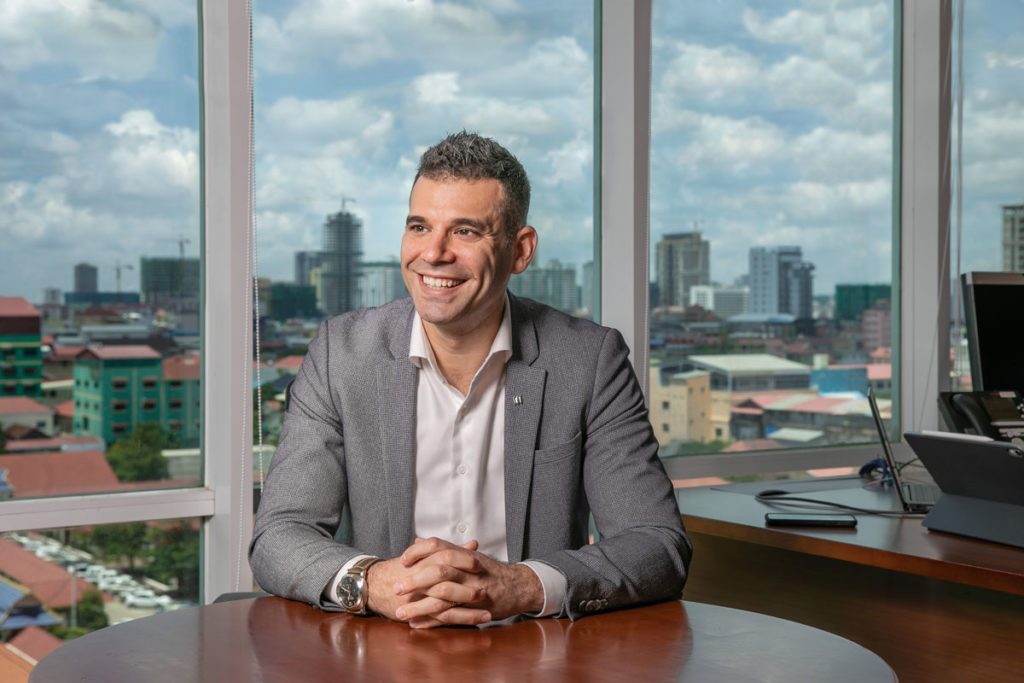Focus talked with the CEO of Manulife Cambodia to discuss how best to expect the unexpected, and to protect what matters to you most.

Early this year Justin Helferich, a father of three boys and two dogs, became the CEO and general manager of Manulife Cambodia, just when the pandemic hit.
His Asian journey began in 2012 in Hong Kong. Two years later, he came to Cambodia for the first time. In 2016, Helferich was the chief financial officer of Manulife Insurance Berhad (“MIB”) in Malaysia.
Helferich is a fan of Asian cuisine. Taking Khmer classes weekly, he feels further connected to the country. With the vision of building a healthier and better financial future for the people of Cambodia, Helferich’s strategies centralize on building a high performing culture within the company, expanding distribution footprint, and embracing digital to the fullest extent .
We sat down with Helferich to discuss Covid-19, life insurance and Cambodia.
Focus: Covid is a case of ‘expect the unexpected’ – people’s sources of income have been
interrupted, so how can people learn from the crisis?
Helferich: This is a great opportunity to raise awareness of the proposition of life insurance, referring to protection against the unknown and uncertain. We can also learn about the acceleration of digital, which has real value in the current environment to help run businesses and enable distribution to customers.
Focus: Covid has hit the four pillars of Cambodia’s economic growth, especially the loss of income. However, Cambodia has a low incident rate on health perspectives. How then do you manage the life insurance industry during this?
Helferich: Life insurance is a long term business. We focus on what we can control. While this is a challenging time, we have the backing of a large global organization to navigate through, so we will be here for the customers. The pandemic is a great opportunity to invest; we have significantly increased the size of our distribution.
This global crisis also show the strength of Manulife as the company provides living and death benefits. If you become critically ill, the company is there. This illustrates to customers that Manulife can help them when they need it the most, especially during the uncertainty of Covid-19.
Focus: For people who start their working life and family planning, why should they purchase life insurance instead of saving money?
Helferich: Here is what I tell my sons. The basic rule to live by is ‘before you build your wealth, you have to protect’. Let’s think about a scenario where something might happen to you. For instance,
when you are no longer earning income, what are you going to do? This is about uncertainty in life, including bad incidents or illnesses. This is when the value of life insurance is most appreciated.
Insurance is a form of protection. There is a value of protecting yourself particularly if you have dependents. That is what insurance is all about. Sometimes, you have parents who might depend on you; it is important to have insurance.
Read: Tips on financial management from Manulife Cambodia’s CEO
Focus: What are the misconceptions of insurance in Cambodia?
Helferich: One misconception focuses on the view that the value can only come in a tangible form. Another misconception is that the protection does not have a high value.
Some people might be worried that the large international player may not be around and committed – I used to get that a lot from customers. One time, a potential customer came to see us. She said, ‘this is a really good policy, but how could I know you are part of Manulife?’
I showed her Manulife’s global website on the information part about Manulife opening up in Cambodia. It is a credibility side of the story. Ultimately, she wanted to see the certificate from the regulator in Canada, recognizing Manulife Cambodia as part of Manulife. Since our inception in 2012, we have invested a lot of time and efforts to educate the market about the importance of life insurance through education seminars and many other awareness raising activities.
Focus: What do you think about customers who lapse in the middle of insurance? What are your takes on the issue?
Helferich: It is challenging for a newer market. So, how do you continue to emphasize that and engage with customers after the initial sale to provide value to them, reassuring that they made the right decision.
We need to work with customers post-sale to provide excellent service and continue to educate them the value of what they bought. It is challenging for the industry, but it is about the value. If you show somebody the value, they are not going to leave you. Life insurance is a long term product, and the company will not make profits unless the customers stay until the certain period.



